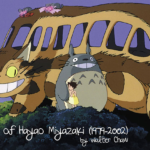****/****
starring Yûya Yagira, Ayu Kitaura, Hiei Kimura, Momoko Shimizu
written and directed by Hirokazu Kore-eda
by Walter Chaw Hirokazu Kore-eda’s Nobody Knows appears so effortless that the weight of it by its closing credits is just astonishing. It’s classical, formal filmmaking of the kind in which the Japanese seem to specialize, full of silences and long takes while featuring a quartet of performances from children that are so natural they feel stolen. Filmed between autumn 2002 and summer 2003, the picture was edited as it was shot, with the structure taking on the progression and characteristics of the four seasons and Kore-eda devising the shape of the next quarter as the previous one finished. No script was written for the children, who were advised before every shot of the substance of what they were to portray. Its evolution was organic, and evidence of that fluidity in its birth is, in the greatest stroke, never betrayed by telltale awkwardness. Nobody Knows feels like the truth unadorned and it feels like poetry–it’s not often that the two share a breath. Between this and Hungarian director Nimród Antal’s Kontroll, I’ve already seen two of the best films of 2005.
Keiko (You) is a young single mother of four: eldest boy Akira (star-in-the-making Yûya Yagira), eldest girl Kyoko (Ayu Kitaura), youngest boy Shigeru (Hiei Kimura), and youngest girl Yuki (Momoko Shimizu)–each of them fathered, we deduce, by a different man. The film is essentially about how Keiko and then Akira conspire to keep the existence of the other children a secret from their new landlord and, eventually, about how Akira is forced into the role of a single parent after Keiko abandons her brood for a never-seen boyfriend in another city.
Nobody Knows is a stunning portrait of life in the kingdom of childhood. It seems to have an innate understanding of the infant morality and decision-making capability of kids, sketching Kyoko’s desire to go to school, Akira’s desire for friends his own age, and Shigeru’s and Yuki’s easy acceptance of their life in seclusion in simple but effective strokes. Kore-eda never pontificates about the plight of abandoned children or the lack of involvement of a broken protective services system. Rather, he observes Akira walking back and forth from the market, pausing to read manga at a convenience store, or counting his steps as he bounds up a flight of stairs–the latter reminding of a moment in Larry Fessenden’s Wendigo when a child, waking from a nightmare, leaps across the space at the top of a staircase. Nobody Knows is as observant of the rituals and superstitions of being young and living in a mysterious world.
Even mother Keiko has a positive air about her that only flags for a moment when she asks Akira why she shouldn’t be happy after he’s accused her of being selfish. That Akira flashes a smile at her wheedling prodding says volumes about that brief stretch of life where children are helpless to forgive their parents. Without anything like a grand message, Nobody Knows exists as a magnificent example of what’s possible when a gifted filmmaker (this is Kore-eda’s fourth fiction film; he has also made several award-winning documentaries) is given the means and the inspiration to work with four unaffected children to tell a story of enduring the confusion of growing up. Lyrical, lovely, the picture is as stunning a document of youth as Isao Takahata’s anime war idyll Grave of the Fireflies and successful in many of the same ways. I don’t know that I ever see children drawn as liltingly as they are in Japanese cinema, where they can be heroes in all of their imperfect glory, and in them is all the hopefulness and courage we hope we’re born with–and hope we haven’t outgrown.




